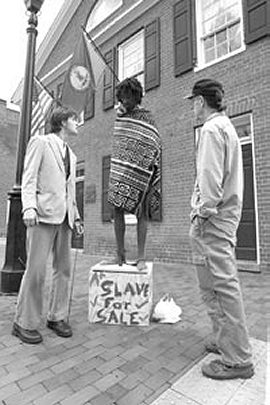|
|
|
|||||



|
"Visitors to the 11th annual Jeffersonian Thanksgiving Festival, which took place last month at Court Square, came expecting to see Revolutionary reenactments. But this year, one display seems to have been a bit too revolutionary for some viewers: a white slave owner, dubbed 'Cornelius A. Banker,' attempting to sell his black slave 'Bilal' for $250. The local NAACP lodged a complaint with the City, but perhaps no one has expressed as much dismay as Mark Beliles, Festival director and pastor at the non-denominational, multi-cultural Grace Covenant Church on Market Street.  Beliles worries that many people thought the Festival had sanctioned the 'auction.' The Hook was among those fooled-- the above image ran in last week's 'Photophile' along with several other Festival pictures. 'Black leaders ask us not to portray the slave trade. We prefer to address it and talk about it,' says Beliles, noting the Festival's inclusion of several African American reenactors who play freed slaves and historic figures such as York, William Clark's slave on the Lewis and Clark expedition west. But as for performing a reenactment of a slave sale, says Beliles, 'We do not and never will.' Rick Turner, Dean of African American Studies at UVA, was also disturbed to hear of the incident-- though he reserves his wrath for the African American man who allowed himself to be what Turner called 'the butt of a serious form of exploitation.' 'There are fools in all races,' Turner says. The object of all this attention is none other than Scottie Williams, known around town as 'Scottie B.,' a soft-spoken sometime restaurateur, DJ, drummer, and now performance artist. 'I'm not trying to start a controversy,' says Scottie, who stopped by the Hook's offices to set the record straight. His ancestors, he says, were slaves who were sold at auctions. He doesn't want them--or their experiences--to be forgotten, as he believes Beliles and Turner would like them to be. 'I'm just here to represent what they're trying to forget,' says Scottie. 'It's a shame that in generations to come, people won't know that part of history.' As for why his staged auction touched so many nerves, Scottie has an explanation: 'I think a lot of people are afraid that people will get angry,' he says. 'It makes me angry when people don't want to portray the true history.' The 'slaveholder' reenactor, played by Anson Parker, springs to Scottie's defense on a local news blog called cvilleindymedia.org. In his article, Parker insists that most observers at the Festival were 'gladly taken' with the auction-- with the exception of one: Mark Beliles. In Beliles, writes Parker, 'We could not have found a more fitting antagonist.' Parker claims Beliles called them racists and demanded that they 'move their show elsewhere.' After nearly three hours of confrontation, including a call by Beliles to the police, the pastor confronted his tormentors once more, this time, Parker writes, in costume. 'Fittingly dressed in the black robes worn historically by French Jesuit Monks who gave smallpox to the Native Americans,' writes Parker, 'Mark Beliles chanted his dark prayers beside the auction block.' Parker sees a certain irony in Beliles' behavior-- and in the reenactments deemed officially appropriate for the Thanksgiving Festival. 'Mark's tailored version of history depicted the happy Negro standing shoulder to shoulder with his master fighting for freedom and justice,' writes Parker. 'The irony of his disapproval of the expression of free speech and freedom to peaceably assemble did not go unnoticed.' Beliles counters that the auction 'constituted not just a free-speech act of their own, but also a fraudulent misrepresentation of our speech.' Further, Beliles says, his Thanksgiving festival responsibly deals with issues of race in history. The festival schedules high-profile African Americans to lecture on black history, even on the 'ugly realities' of slavery and racism. 'We have done this for years, sometimes having dramatic skits just focused on this and on racist attitudes of that time,' says Beliles. 'At our Festival we have also urged people to pray and seek repentance and reconciliation even today.' Turner backs Beliles. He considers the reenactment as offensive as old minstrel show 'blackface' performances, and he says he sees no educational value in such a stunt. What about the historic plaque in Court Square noting the site of an 18th century slave auction? Turner has no argument with that memorial. 'That's a part of history that should be recorded,' he says. 'But I don't
think you need to reenact that horrible kind of situation with any sense
that this is going to be education.'" (Courteney Stuart, The Hook,
December 2, 2004)
|
